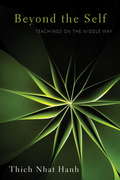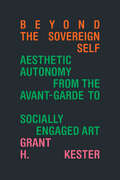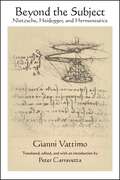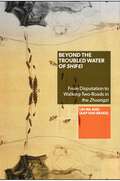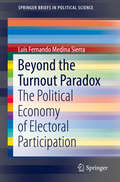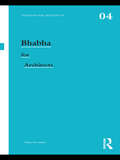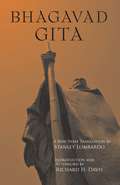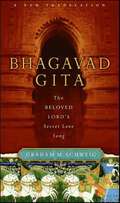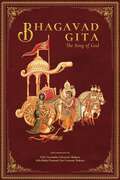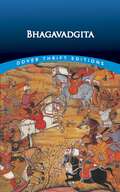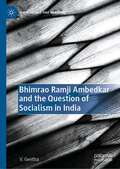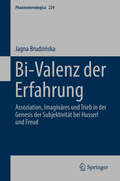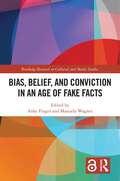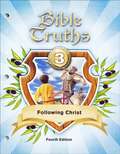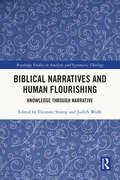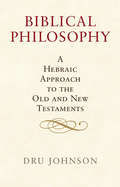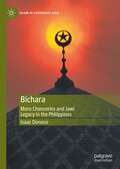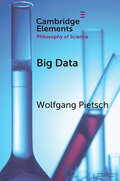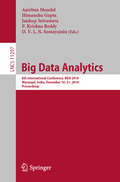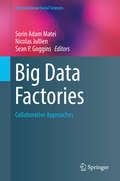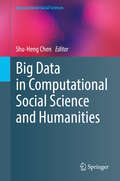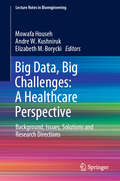- Table View
- List View
Beyond the Self: Teachings on the Middle Way
by Thich Nhat HanhOne of the Buddha's most central ideas is the importance of transcending "either/or" thinking to avoid the trap of extremist views. In Beyond the Self Thich Nhat Hanh suggests that we can find tranquility by embracing all aspects of life, instead of focusing on what we like and dislike. The book contains Nhat Hanh's original translation of the Sutra on the Middle Way, as well as his commentary on how we can use this teaching to better understand how to navigate our difficulties and find peace of mind. By changing how we see the world, Beyond the Self helps us transform ourselves.
Beyond the Sovereign Self: Aesthetic Autonomy from the Avant-Garde to Socially Engaged Art
by Grant H. KesterIn Beyond the Sovereign Self Grant H. Kester continues the critique of aesthetic autonomy begun in The Sovereign Self, showing how socially engaged art provides an alternative aesthetic with greater possibilities for critical practice. Instead of grounding art in its distance from the social, Kester shows how socially engaged art, developed in conjunction with forms of social or political resistance, encourages the creative capacity required for collective political transformation. Among others, Kester analyzes the work of conceptual artist Adrian Piper, experimental practices associated with the escrache tradition in Argentina, and indigenous Canadian artists such as Nadia Myre and Michèle Taïna Audette, showing how socially engaged art catalyzes forms of resistance that operate beyond the institutional art world. From the Americas and Europe to Iran and South Africa, Kester presents a historical genealogy of recent engaged art practices rooted in a deep history of cultural production, beginning with nineteenth-century political struggles and continuing into contemporary anticolonial resistance and other social movements.
Beyond the Subject: Nietzsche, Heidegger, and Hermeneutics (SUNY series in Contemporary Italian Philosophy)
by Gianni VattimoIn Beyond the Subject Gianni Vattimo offers a reading of Nietzsche and Heidegger that shows how the premises to overcome the metaphysical Subject were already embedded in their thought. Vattimo makes a case for a Nietzsche who is not concerned with the structure and glorification of the Overman, but rather with its opposite, by showing how it is the single individual who must see and accept his/her potential and then excel and develop an inner strength and ethic. He reads Heidegger as concerned with the inevitable distortion present in every interpretation, which, when confronted and accepted, humbles us to deal with a less overarching telos or Grund, and makes us more attuned to contingency and interpersonal communication—what Vattimo calls a "weakened" notion of being. These original readings of Nietzsche and Heidegger pave the way for Vattimo's concept of weak thought and open up to a future social ethic that is less agonistic and more community oriented. This edition includes two supplementary essays from 1986 and 1988 that expand on the same themes, providing a deeper look at an important decade in the development of Vattimo's thought.
Beyond the Troubled Water of Shifei: From Disputation to Walking-Two-Roads in the Zhuangzi (SUNY series in Chinese Philosophy and Culture)
by Lin Ma Jaap van BrakelIn recent decades, a growing concern in studies in Chinese intellectual history is that Chinese classics have been forced into systems of classification prevalent in Western philosophy and thus imperceptibly transformed into examples that echo Western philosophy. Lin Ma and Jaap van Brakel offer a methodology to counter this approach, and illustrate their method by carrying out a transcultural inquiry into the complexities involved in understanding shi and fei and their cognate phrases in the Warring States texts, the Zhuangzi in particular. The authors discuss important features of Zhuangzi's stance with regard to language-meaning, knowledge-doubt, questioning, equalizing, and his well-known deconstruction of the discourse in ancient China on shifei. Ma and van Brakel suggest that shi and fei apply to both descriptive and prescriptive languages and do not presuppose any fact/value dichotomy, and thus cannot be translated as either true/false or right/wrong. Instead, shi and fei can be grasped in terms of a pre-philosophical notion of fitting. Ma and van Brakel also highlight Zhuangzi's idea of "walking-two-roads" as the most significant component of his stance. In addition, they argue that all of Zhuangzi's positive recommendations are presented in a language whose meaning is not fixed and that every stance he is committed to remains subject to fundamental questioning as a way of life.
Beyond the Turnout Paradox
by Luis Fernando Medina SierraThis Brief uses game-theoretic analysis to debunk the turnout paradox and offers an alternative economic model to elucidate the patterns behind the socioeconomic bias in turnout. The author argues that the turnout paradox—the idea that rational, strategic actors would not vote in an election—is an overstated problem, and that, contrary to widespread belief, game-theoretic models of elections with highly realistic parameters are compatible with high turnout. The author applies the method of stability sets to the study of voting games so as to characterize the behavior of electoral turnout in response to the game’s structural parameters. To illustrate the power and potential of this framework, the author then develops a politico-economic model that generates testable theories about the way in which the modern welfare state and redistribution of wealth can shape the patterns of biased turnout that exist in most democracies. By turning a classic problem of rational choice into a source of new methods of analysis this Brief allows game theory to intervene in relevant conversations about the political economy of electoral participation, creating an opportunity for formal methods to make a welcome contribution to the discipline. As such, this Brief will be of use to scholars and student of political science, economics, political economy, and public policy, especially those who work in the tradition of formal methods.
Bhabha for Architects (Thinkers for Architects)
by Felipe HernandezThe work of Homi K. Bhabha has permeated into numerous publications which use postcolonial discourse as a means to analyze architectural practices in previously colonized contexts, particularly in Africa, Asia, the Middle-East, South-East Asia and, Latin America. Bhabha's use of the concept of ‘space’ has made his work highly appealing to architects and architectural theorists. This introductory book, specifically for architects, focuses on Bhabha’s seminal book The Location of Culture and reveals how his work contributes to architectural theory and the study of contemporary architectures in general, not only in colonial and postcolonial contexts.
Bhagavad Gita: A Biography (Lives Of Great Religious Bks. #23)
by Richard H. DavisStanley Lombardo's new verse translation of the most famous free-standing sequence from the great Indian epic The Mahabharata hews closely to the meaning, verse structure, and performative quality of the original and is invigorated by its judicious incorporation of key Sanskrit terms in transliteration, for which a glossary is also provided. The translation is accompanied by Richard H. Davis' brilliant Introduction and Afterword. The latter, "Krishna on Modern Fields of Battle," offers a fascinating look at the illuminating role the poem has played in the lives and struggles of a few of the most accomplished figures in recent world history.
Bhagavad Gita: The Beloved Lord's Secret Love Song
by Graham M. SchweigAn elegant, highly accessible new English translation of the classic Hindu text, one of the most important sacred scriptures in world religion.The Bhagavad Gita is often regarded as the Bible of India. With a gripping story and deeply compelling message, it is unquestionably one of the most popular sacred texts of Asia and, along with the Bible and the Qur’an, one of the most important holy scriptures in the world.Part of an ancient Hindu epic poem, the dialogue of the Bhagavad Gita takes place on a battlefield, where a war for the possession of a North Indian kingdom is about to ensue between two noble families related by blood. The epic’s hero, young Prince Arjuna, is torn between his duty as a warrior and his revulsion at the thought of his brothers and cousins killing each other over control of the realm. Frozen by this ethical dilemma, he debates the big questions of life and death with the supreme Hindu deity Krishna, cleverly disguised as his charioteer. By the end of the story, Eastern beliefs about mortality and reincarnation, the vision and practice of yoga, the Indian social order and its responsibilities, family loyalty, spiritual knowledge, and the loftiest pursuits of the human heart are explored in depth. Explaining the very purpose of life and existence, this classic has stood the test of twenty-three centuries. It is presented here in a thoroughly accurate, illuminating, and beautiful translation that is sure to become the standard for our day.“Schweig’s new, beautiful, and accessible translation of the Gita will remain the standard text of this marvelous Song for years to come.” —Huston Smith, author of The World’s Religions“Crystal clear and eminently readable.” —Ariel Glucklich, Professor of Theology (Hinduism) at Georgetown University
Bhagavad Gita: The Song of God
by Swami B. Puri&“One who sings and chants these supremely confidential teachings to My devotees will attain supreme devotion for Me and will attain Me. There is no doubt in this matter.&” —Sri Krishna, Bhagavad-gita 18.68If sharing the confidential meaning of the yoga of devotional love, bhakti-yoga, is the standard for spiritual advancement, then this is the definitive edition of the Bhagavad-gita. It is the first English translation that includes summaries of the commentaries of four of the most prominent expounders of the tradition of bhakti-yoga: Srimad Bhaktivinoda ?hakura, Srimad Visvanatha Cakravarti Thakura, Srila Bhakti Pramode Puri Gosvami, and Sri Kanailal Pancatirtha—alongside the highly acclaimed translation of the text itself by Srila Bhakti Rakshak Sridhar Dev Gosvami. Taken together, no other edition of this sacred text has so comprehensively conveyed the timeless spiritual wisdom of the Bhagavad-gita.
Bhagavad-Gita: Treatise of Self-help
by Bs MurthyThe spiritual ethos and the philosophical outlook that the Bhagavad-Gita postulates paves the way for the liberation of man, who, as Rousseau said, ‘being born free, is everywhere in chains’. But equally it is a mirror of human psychology, which enables man to discern his debilities for appropriate redressal. All the same, the boon of an oral tradition that kept it alive for over two millennia became its bane with the proliferation of interpolations therein. Besides muddying its pristine philosophy, these insertions affect the sequential conformity and structural economy of the grand discourse. What is worse, to the chagrin of the majority of the Hindus, some of these legitimize the inimical caste system while upholding the priestly perks and prejudices. This rendition seeks to restore to the Gita, its original character by ridding it of hundred and ten interpolations, which tend to keep the skeptics away from it. And ironically these muddle the understanding of the adherents as well. In the theatre of man as nothing surpasses the drama of war, the stage for unveiling the Gita’s unrivalled philosophy was set on the battleground of Kurukshetra at the threshold of the battle of Mahabharata.
Bhagavadgita (Dover Thrift Editions)
by Sir Edwin ArnoldThe Bhagavadgita is part of the great Indian epic the Mahabharata, and it is one of the major religious documents of the world, occupying in Hinduism a position not unlike the Sermon on the Mount in Christianity. One of the most celebrated treasures of world literature as well, it is in the form of a poetic dialogue between the epic's hero, Arjuna, and his friend Krishna, believed to be an incarnation of God.The dialogue, which takes place on the eve of an historic battle, probes the nature of God and what man should do to reach him. As the Bhagavadgita unfolds, this majestic poem provides a fascinating synopsis of the religious thought and experience of India through the ages. This edition offers the classic English verse translation by Sir Edwin Arnold (1832-1904), long admired for its evocation of the true feeling of the original poetry.
Bhartiya Dnyan Pranali First Semester FYBA New NEP Syllabus - RTMNU: भारतीय ज्ञान प्रणाली पहिले सत्र एफ.वाय.बी.ए. नवीन एन.इ.पी. अभ्यासक्रम - राष्ट्रसंत तुकडोजी महाराज नागपूर विद्यापीठ
by Dr Nalini Ishwardas Borkarभारतीय ज्ञान प्रणाली हे पुस्तक भारतीय ज्ञान प्रणालीच्या विविध पैलूंवर प्रकाश टाकते. यात प्राचीन भारतीय तत्त्वज्ञान, विज्ञान, गणित, योग, आयुर्वेद, कला आणि संस्कृती यांचा सखोल अभ्यास केला आहे. भारतीय शिक्षण परंपरा आणि तत्त्वज्ञानाचे स्वरूप, तसेच वेद, उपनिषदे, आणि अन्य ग्रंथांमधील तत्त्वज्ञानाचा आधुनिक जगाशी असलेला संबंध यात स्पष्ट करण्यात आला आहे. ग्रामीण आणि शहरी भागातील शिक्षण पद्धती, गुरुकुल आणि आधुनिक शिक्षण प्रणाली यांचा तुलनात्मक अभ्यास देखील पुस्तकात समाविष्ट आहे. विद्यार्थी-अनुकूल भाषाशैली आणि सुसंगत उदाहरणांच्या मदतीने संकल्पना स्पष्ट करण्यात आल्या आहेत, त्यामुळे अभ्यासक आणि संशोधकांसाठी हे पुस्तक उपयुक्त ठरते.
Bhartiya Dnyanpranali First Semester FYBA New NEP Syllabus - SPPU: भारतीय ज्ञानप्रणाली प्रथम सत्र एफ.वाय.बी.ए. नवीन एन.इ.पी. अभ्यासक्रम - सावित्रीबाई फुले पुणे यूनिवर्सिटी
by Dr Neeta Suresh Mohite Dr Dnyandev Laxman Nitve Dr Rupali Bipin Sheth Dr Manisha Deepak Puranikसावित्रीबाई फुले पुणे विद्यापीठाच्या (SPPU) नवीन राष्ट्रीय शैक्षणिक धोरण (NEP) 2020 अंतर्गत प्रथम वर्ष बी.ए. (FYBA) अभ्यासक्रमात भारतीय ज्ञानप्रणाली अभ्यासक्रम समाविष्ट केला आहे. भारतीय ज्ञान परंपरा या पुस्तकात भारताच्या प्राचीन आणि समृद्ध ज्ञानप्रणालीचा अभ्यास सखोलपणे मांडला आहे. या ज्ञानप्रणालीमध्ये वेद, उपनिषद, दर्शन शास्त्रे, आयुर्वेद, योग आणि खगोलशास्त्र यांचा समावेश असून, मानवी जीवनाच्या सर्व पैलूंवर प्रकाश टाकणारी ही परंपरा विज्ञान, तत्त्वज्ञान आणि अध्यात्म यांचा समन्वय साधते. पुस्तकात भारताच्या सांस्कृतिक वारशाचा आढावा घेत, आधुनिक शिक्षण पद्धतीशी त्याचा मेळ घालण्याचा प्रयत्न केला आहे. विद्यार्थ्यांसाठी तसेच भारतीय ज्ञानप्रणालीवर संशोधन करू इच्छिणाऱ्यांसाठी हे पुस्तक उपयुक्त ठरते. साधी व सोपी भाषा आणि मुद्देसूद मांडणी यामुळे वाचकांना हे पुस्तक समजण्यास आणि विचारशील बनण्यासाठी प्रेरित करते.
Bhimrao Ramji Ambedkar and the Question of Socialism in India (Marx, Engels, and Marxisms)
by V. GeethaThis book offers a reading of Bhimrao Ambedkar’s engagement with the idea and practice of socialism in India by linking it to his lifelong political and philosophical concerns: the annihilation of the caste system, untouchability and the moral and philosophical systems that justify either. Rather than view his ideas through a socialist lens, the author suggests that it is important to measure the validity of socialist thought and practice in the Indian context, through his critique of the social totality. The book argues its case by presenting a broad and connected overview of his thought world and the global and local influences that shaped it. The themes that are taken up for discussion include: his understanding of the colonial rule and the colonial state; history and progress; nationalism and the questions he posed the socialists; his radical critique of the caste system and Brahmancal philosophies, and his unusual interpretation of Buddhism.
Bi-Valenz der Erfahrung: Assoziation, Imaginäres und Trieb in der Genesis der Subjektivität bei Husserl und Freud (Phaenomenologica #229)
by Jagna BrudzińskaEdmund Husserls Phänomenologie und Sigmund Freuds Psychoanalyse sind zwei große Denktraditionen des 20. Jahrhunderts. Erstmals wird in diesem Buch die lebendige problemgebundene Beziehung zwischen beiden untersucht, und zwar ausgehend von Husserls genetischer Phänomenologie. Im Fokus stehen drei große Erfahrungsbereiche des Menschen: die Assoziation, die Phantasie und der Trieb. Wie sich zeigt, spielen alle drei eine Schlüsselrolle, sowohl für Husserls als auch für Freuds Denken.Die Autorin hat für ihre Studie veröffentlichte wie auch unveröffentlichte Texte aus dem Werk Husserls berücksichtigt und die Ergebnisse lassen die Phänomenologie in einem neuen Licht erscheinen. So rücken in diesem Buch, anders als im allgemein-philosophischen Verständnis von Intentionalität, spezifische Formen der phantasmatischen und imaginären Intentionalität in den Vordergrund. Auf diese Weise betrachtet, zeigt sich die subjektive Erfahrung als eine menschliche Entwicklungsstruktur, die unter einer doppelten Ordnung steht: Wir und unsere Welt sind nicht nur durch Wahrnehmung strukturiert, sondern auch durch imaginäre Leistungen, durch triebhafte Tendenzen und unbewusste Wünsche. Die Autorin findet dafür den Begriff der Bi-Valenz, der Zweiwertigkeit der personalen Realität.Mit dieser Untersuchung werden zwei Ziele erreicht. Einerseits befreit die Autorin das Trieb-Verständnis der Psychoanalyse von seinem naturalistischen Rest, andererseits eröffnet sie für die Phänomenologie einen neuen Bereich anschaulicher Erfahrung: das dynamische Unbewusste. Das Medium dieser Erfahrung ist eine starke, produktive Phantasie, die aus triebhaften Quellen schöpft und unsere Realität mit-gestaltet. Der Band richtet sich an Studierende und Wissenschaftler, die sich für genetische Phänomenologie und die Philosophie der Psychoanalyse interessieren.
Bias, Belief, and Conviction in an Age of Fake Facts (Routledge Research in Cultural and Media Studies)
by Anke Finger Manuela WagnerIn this book, authors engage in an interdisciplinary discourse of theory and practice on the concept of personal conviction, addressing the variety of grey zones that mark the concept. Bias, Belief, and Conviction in an Age of Fake Facts discusses where our convictions come from and whether we are aware of them, why they compel us to certain actions, and whether we can change our convictions when presented with opposing evidence, which prove our personal convictions "wrong". Scholars from philosophy, psychology, comparative literature, media studies, applied linguistics, intercultural communication, and education shed light on the topic of personal conviction, crossing disciplinary boundaries and asking questions not only of importance to scholars but also related to the role and possible impact of conviction in the public sphere, education, and in political and cultural discourse. By taking a critical look at personal conviction as an element of inquiry within the humanities and social sciences, this book will contribute substantially to the study of conviction as an aspect of the self we all carry within us and are called upon to examine. It will be of particular interest to scholars in communication and journalism studies, media studies, philosophy, and psychology.
Bible Truths 3: Following Christ
by Daryl KoppA doctrinal study including the nature and person of God, Creation, the fall of man, God's mercy, God's judgment, God's dealings with Israel and events from the life of Christ.
Biblical Narratives and Human Flourishing: Knowledge Through Narrative (Routledge Studies in Analytic and Systematic Theology)
by Eleonore Stump Judith WolfeBiblical narratives include some of the most important and influential narratives in human history, shaping human understanding of the most basic questions of human life as lived individually or in social association with others. These narratives have lasted for so many centuries because they offer deep insights into the nature of the human condition and human flourishing. This volume includes chapters by accomplished philosophers and theologians who bring their expertise to bear on biblical narratives to show the way in which each narrative contributes something distinctive to our understanding of human flourishing. They broaden the ongoing work in analytic theology with a new focus on narrative and the knowledge of persons in philosophical-theological biblical exegesis. They also illustrate the narrative cognition that this methodology can provide. The book will be of interest to scholars of philosophy, theology, and biblical studies.
Biblical Philosophy: A Hebraic Approach to the Old and New Testaments
by Dru JohnsonIn Biblical Philosophy, Dru Johnson examines how the texts of Christian Scripture argue philosophically with ancient and modern readers alike. He demonstrates how biblical literature bears the distinct markers of a philosophical style in its use of literary and philosophical strategies to reason about the nature of reality and our place within it. Johnson questions traditional definitions of philosophy and compares the Hebraic style of philosophy with the intellectual projects of ancient Egypt, Mesopotamia, and Hellenism. Identifying the genetic features of the Hebraic philosophical style, Johnson traces its development from its hybridization in Hellenistic Judaism to its retrieval by the New Testament authors. He also shows how the Gospels and letters of Paul exhibit the same genetic markers, modes of argument, particular argument forms, and philosophical convictions that define the Hebraic style, while they engaged with Hellenistic rhetoric. His volume offers a model for thinking about philosophical styles in comparative philosophical discussions.
Bichara: Moro Chanceries and Jawi Legacy in the Philippines (Islam in Southeast Asia)
by Isaac DonosoThis book focuses on the written heritage of Muslims in the Philippines, the historical constitution of chancelleries within the Islamic sultanates, and the production of official letters to conduct local and international diplomacy. The standard narrative on Muslims in the Philippines is one that centres political and armed struggles within the region. However, two important aspects remain unattended: the cultural and intellectual production of the sultanates, and the Moro involvement in Southeast Asian Islamic civilization. This book connects the development and personality of the Philippine sultanates into the regional context of local communities that adopted an international faith. Political alliances and religious missions altered different ethnolinguistic groups and furnished them with the Word, the Qur’anic message, and the Arabic script. Indeed, customary orality and Adab shaped a way of being and acting modelled after what was called the Bichara. Particularly, the book studies the Moro Letter as cultural craft with political meaning, and Jawi heritage in the Philippines. A general catalogue of Jawi manuscripts from the National Archives of the Philippines is provided as appendix.
Big Data (Elements in the Philosophy of Science)
by Wolfgang PietschBig Data and methods for analyzing large data sets such as machine learning have in recent times deeply transformed scientific practice in many fields. However, an epistemological study of these novel tools is still largely lacking. After a conceptual analysis of the notion of data and a brief introduction into the methodological dichotomy between inductivism and hypothetico-deductivism, several controversial theses regarding big data approaches are discussed. These include, whether correlation replaces causation, whether the end of theory is in sight and whether big data approaches constitute entirely novel scientific methodology. In this Element, I defend an inductivist view of big data research and argue that the type of induction employed by the most successful big data algorithms is variational induction in the tradition of Mill's methods. Based on this insight, the before-mentioned epistemological issues can be systematically addressed.
Big Data Analytics: 6th International Conference, BDA 2018, Warangal, India, December 18–21, 2018, Proceedings (Lecture Notes in Computer Science #11297)
by Jaideep Srivastava P. Krishna Reddy Anirban Mondal Himanshu Gupta D. V. L. N. SomayajuluThis book constitutes the refereed proceedings of the 6th International Conference on Big Data analytics, BDA 2018, held in Warangal, India, in December 2018. The 29 papers presented in this volume were carefully reviewed and selected from 93 submissions. The papers are organized in topical sections named: big data analytics: vision and perspectives; financial data analytics and data streams; web and social media data; big data systems and frameworks; predictive analytics in healthcare and agricultural domains; and machine learning and pattern mining.
Big Data Factories: Collaborative Approaches (Computational Social Sciences)
by Sean P. Goggins Sorin Adam Matei Nicolas JullienThe book proposes a systematic approach to big data collection, documentation and development of analytic procedures that foster collaboration on a large scale. This approach, designated as "data factoring" emphasizes the need to think of each individual dataset developed by an individual project as part of a broader data ecosystem, easily accessible and exploitable by parties not directly involved with data collection and documentation. Furthermore, data factoring uses and encourages pre-analytic operations that add value to big data sets, especially recombining and repurposing. The book proposes a research-development agenda that can undergird an ideal data factory approach. Several programmatic chapters discuss specialized issues involved in data factoring (documentation, meta-data specification, building flexible, yet comprehensive data ontologies, usability issues involved in collaborative tools, etc. ). The book also presents case studies for data factoring and processing that can lead to building better scientific collaboration and data sharing strategies and tools. Finally, the book presents the teaching utility of data factoring and the ethical and privacy concerns related to it. Chapter 9 of this book is available open access under a CC BY 4. 0 license at link. springer. com
Big Data in Computational Social Science and Humanities (Computational Social Sciences)
by Shu-Heng ChenThis edited volume focuses on big data implications for computational social science and humanities from management to usage. The first part of the book covers geographic data, text corpus data, and social media data, and exemplifies their concrete applications in a wide range of fields including anthropology, economics, finance, geography, history, linguistics, political science, psychology, public health, and mass communications. The second part of the book provides a panoramic view of the development of big data in the fields of computational social sciences and humanities. The following questions are addressed: why is there a need for novel data governance for this new type of data?, why is big data important for social scientists?, and how will it revolutionize the way social scientists conduct research? With the advent of the information age and technologies such as Web 2.0, ubiquitous computing, wearable devices, and the Internet of Things, digital society has fundamentally changed what we now know as "data", the very use of this data, and what we now call "knowledge". Big data has become the standard in social sciences, and has made these sciences more computational. Big Data in Computational Social Science and Humanities will appeal to graduate students and researchers working in the many subfields of the social sciences and humanities.
Big Data, Big Challenges: Background, Issues, Solutions and Research Directions (Lecture Notes in Bioengineering)
by Mowafa Househ Andre W. Kushniruk Elizabeth M. BoryckiThis is the first book to offer a comprehensive yet concise overview of the challenges and opportunities presented by the use of big data in healthcare. The respective chapters address a range of aspects: from health management to patient safety; from the human factor perspective to ethical and economic considerations, and many more. By providing a historical background on the use of big data, and critically analyzing current approaches together with issues and challenges related to their applications, the book not only sheds light on the problems entailed by big data, but also paves the way for possible solutions and future research directions. Accordingly, it offers an insightful reference guide for health information technology professionals, healthcare managers, healthcare practitioners, and patients alike, aiding them in their decision-making processes; and for students and researchers whose work involves data science-related research issues in healthcare.
